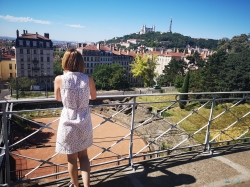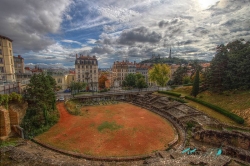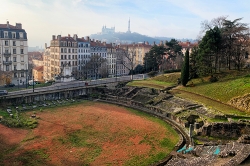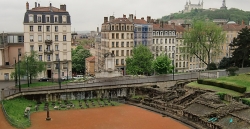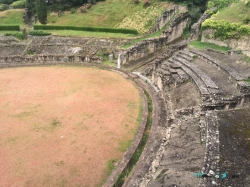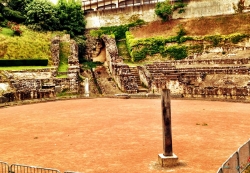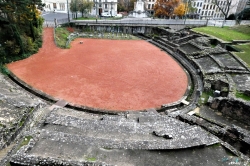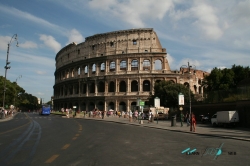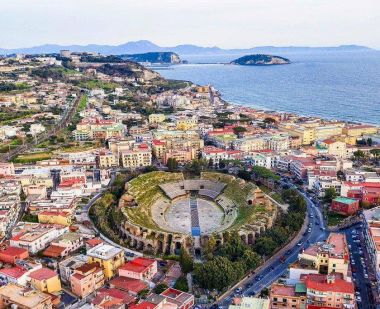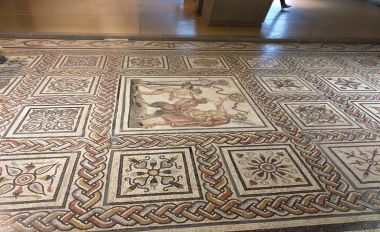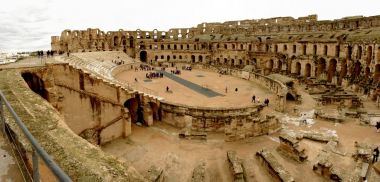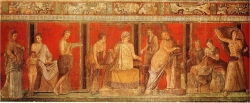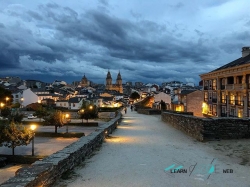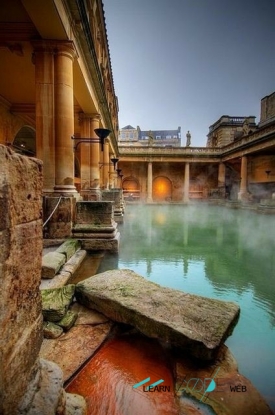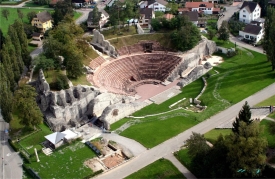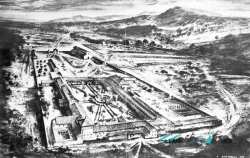ABOUT Amphitheatre of the Three Gauls
The Amphitheatre of the Three Gauls (French: Amphithéâtre des Trois Gaules) of Lugdunum (Lyon) was part of the Sanctuary of the Three Gauls dedicated to the cult of Rome and Augustus celebrated by the 60 Gallic tribes when they gathered at Lugdunum. In 1961, it was classified as a monument historique.
The amphitheatre was built at the foot of the La Croix-Rousse hill at what was then the confluence of the Rhône and Saône . An inscription on one of the blocks found in 1957 (Inscription latine des Trois Gaules, n°217 (AE 1959, n°61)) connects the amphitheatre with the sanctuary of Rome and Augustus and allows its origins to be identified.
The amphitheatre was expanded at the start of the 2nd century, according to J. Guey by C. Julius Celse, procurator of Gallia Lugdunensis from 130 to 136. Two galleries were added around the old amphitheatre, raising its width from 25 metres to 105 metres and its capacity to about 20,000 seats (though this was still modest compared to the amphitheatres at Nîmes and Arles). In so doing it made it a building open to the whole population of Lugdunum and its environs. Historians identify the building as the site of Saints Blandina and Pothinus's martyrdoms as part of the persecution in 177 and a post in the middle of the arena commemorates this event and Pope John-Paul II's visit to Lyon in 1986.
A 16th century plan of Lyon indicates the survival to that date of some arches (probably substructures) and a hollow (the arena) known as "Corbeille de la Déserte". The first excavations between 1818 and 1820 revealed the perimeter of the arena before re-covering it, allowing urban expansion in the 19th century to destroy the south half of the amphitheatre remains. From 1956 serious excavations were begun, followed by 1966/67, 1971/72 and 1976/78 campaigns, leading to the exposed remains on show today. The modest remains which had survived (the supporting walls for half of the amphitheatre's superstructure) were integrated into the Jardin des Plantes and opened to visitors.
The amphitheatre was built at the foot of the La Croix-Rousse hill at what was then the confluence of the Rhône and Saône . An inscription on one of the blocks found in 1957 (Inscription latine des Trois Gaules, n°217 (AE 1959, n°61)) connects the amphitheatre with the sanctuary of Rome and Augustus and allows its origins to be identified.
The amphitheatre was expanded at the start of the 2nd century, according to J. Guey by C. Julius Celse, procurator of Gallia Lugdunensis from 130 to 136. Two galleries were added around the old amphitheatre, raising its width from 25 metres to 105 metres and its capacity to about 20,000 seats (though this was still modest compared to the amphitheatres at Nîmes and Arles). In so doing it made it a building open to the whole population of Lugdunum and its environs. Historians identify the building as the site of Saints Blandina and Pothinus's martyrdoms as part of the persecution in 177 and a post in the middle of the arena commemorates this event and Pope John-Paul II's visit to Lyon in 1986.
A 16th century plan of Lyon indicates the survival to that date of some arches (probably substructures) and a hollow (the arena) known as "Corbeille de la Déserte". The first excavations between 1818 and 1820 revealed the perimeter of the arena before re-covering it, allowing urban expansion in the 19th century to destroy the south half of the amphitheatre remains. From 1956 serious excavations were begun, followed by 1966/67, 1971/72 and 1976/78 campaigns, leading to the exposed remains on show today. The modest remains which had survived (the supporting walls for half of the amphitheatre's superstructure) were integrated into the Jardin des Plantes and opened to visitors.



